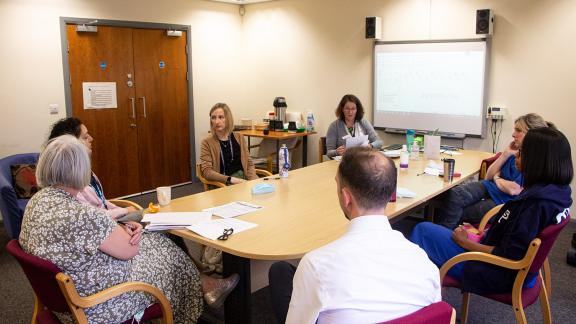Team Engagement and Development in Lancashire

Lancashire Teaching Hospitals NHS Foundation Trust has developed an innovative approach to staff engagement called the Team Engagement and Development (TED) tool to encourage leaders to take ownership of engagement and satisfaction. This has enabled the organisation to build team leaders’ capability in making improvements to colleague experience and take a continuous improvement approach in response to the NHS Staff Survey results.
Key benefits and outcomes
- The trust achieved above the national average for all the NHS People Promise elements as measured in the NHS Staff Survey in 2022.
- It was the only acute trust in the North West to have improve its staff engagement score compared with 2019 results.
- Over 160 leaders completed the TED tool, enabling them to use a structured approach to conversations about the team effectiveness, improve engagement levels and explore what the team would like to do to bring about improvements.
- It found when more teams use the TED tool and process it leads to higher levels of colleague experience as measured by the NHS Staff Survey.
- Leaders have developed their capability in improving team engagement, offering the opportunity to create a sense of team purpose, bringing teams together to review effectiveness, and demonstrating compassionate, action-centred leadership by making improvements happen.
What the organisation faced
The trust had below average NHS Staff Survey results with staff engagement failing to meet the national average for several years. Actions at a corporate level made little impact on colleague experience and levels of staff satisfaction. The lowest scoring themes were typically around colleagues not feeling involved in change or decision making, quality of communication from managers, and a lack of team working.
The organisational development (OD) team spent significant amounts of time providing team-level consultancy and bespoke support. This took focus away from delivering interventions that would have a wider impact on the whole workforce and supporting the delivery of both the trust’s strategic aims and the workforce and organisational development strategy.
Leaders and managers in the organisation were passive about their role in staff satisfaction and engagement. There was a lack of practical action taking place to respond to NHS Staff Survey results at all levels, meaning results were not responded to, colleagues not engaged in identifying what could be improved, and consequently no tangible improvements being made.
What the organisation did
To begin with the OD team stepped back, reflected on how the way it worked could be perpetuating the problem. The team considered the cultural factors which were contributing to the situation and identified what would mobilise the biggest transformation and impact. The team recognised the needed to stop reacting and to respond differently.
To support this a literature search was completed to understand the range of factors which help create high-performing, highly engaged and effective teams in all sectors. The OD team was able to identify eight clear factors which would support teams to reflect on how they are working together and then act to bring about improvements.
It was determined that a team diagnostic questionnaire and a toolkit of resources needed to be created that OD, line managers and the wider workforce could use. The team diagnostic questionnaire would be recommended to be used on a cyclical basis and that to be a line manager in the organisation meant that you held regular conversations with your team using this approach. From this the TED tool, toolkit and approach was developed.
The next step was identifying the right questions to ask under each of the eight factors, as well as starting to build the toolkit and creating new resources that team leaders would find useful. The TED tool needed to be online, so OD worked with an IT developer to create an intranet-based tool, with the focus on the team leader being the administrator rather than it needing to be centrally managed.
To launch the TED tool a training session was designed to equip team leaders with the knowledge and understanding of what engagement is, their role in taking action to enhance levels of team engagement, how to use the TED tool, and how to choose the best tools from the toolkit to help the team surface issues and move forward.
The OD team sought to align this approach in the organisational strategy by incorporating into the organisation’s People Plan, annual targets measured performance reporting, aligning with the continuous quality improvement approach, integrating with freedom to speak up and raising concerns, and including within the ward accreditation framework and quality of care assessment.
There was a strong communication campaign around TED, with informal information sharing delivered through a community of practice approach know as the TED Coffee Catch Ups.
The trust continues to evolve its TED approach, based on organisational need, team leader feedback, themes and issues identified via TED and the NHS Staff Survey. More recently the TED tool has been revamped into an internet-based tool, with its own dedicated website and online toolkit, this was thanks to the investment provided by NHS England after it undertook an independent review into team-based engagement tools.
Results and benefits
Since the launch of the TED tool, the trust has seen year-on-year improvements in levels of staff satisfaction and engagement as measured in the NHS Staff Survey. In 2022, the organisation scored above the national average for all People Promise elements.
Internal research has shown that when higher numbers of TED are completed it leads to increased levels of staff satisfaction and achievement of or above the national average for the People Promise elements as measured in the NHS Staff Survey. It has been found that when scores are higher for the TED factors team purpose, working together and leadership, there are increases in levels of satisfaction in the teamwork, line manager, motivation and involvement questions asked as part of the NHS Staff Survey.
The TED approach has increased team leader competence, confidence and awareness of their role in supporting team engagement and taking steps to increase team effectiveness. It has also allowed the trust to create capacity in the OD team to enable it to deliver on wider NHS People Plan priorities and support the more complex teams to develop.
Through taking this approach, the organisation has increased the focus at all levels on staff satisfaction and recognising the importance of investing in team engagement and effectiveness to improve the performance of teams.
Overcoming obstacles
Obstacles encountered when implementing this programme have been around raising awareness and the competing priorities of clinical and operational team leaders.
To resolve the communication barriers, multiple methods of engagement with teams around using TED are deployed. However, the most effective has been found to be word of mouth combined with senior leaders showing their belief and commitment to using TED. To enable this TED is talked about at every opportunity, competition takes place, as well setting up TED community of practice. The trust has a regular spotlight on a TED tool each month which helps team leaders to see how the TED tools can help them to lead their team at any point in time.
To overcome the issue with competing priorities team leaders face, TED has been embedded into other processes such as the ward accreditation process which helps team leaders to see that completing TED helps them to deliver on other priorities in their role.
Top tips
- Find ways to up-skill team leaders by encouraging them to talk about what it is like to work in their team.
- Don’t give up and switch focus if at first your idea doesn’t seem to be taking off - leading an organisation wide programme of work takes time, it can be easy to stop if at first impact is not being delivered.
- Keep evolving your approach - by evolving your approach, finding new ways to embed the programme of work it will ensure it stays fresh and relevant to the organisational context.
- Get others to promote the benefit – word of mouth is a powerful way to gain others to buy in, reduce scepticism and increase voluntary participation.
- Allow a sense of choice and control to gain engagement to participation in this type of work - when team leaders feel empowered to decide when to use the TED tool it helps them to take greater ownership.
- Keep it simple - bringing about improvements to team engagement and team effectiveness does not need to be complicated, complex or long winded.
- Implementing an organisation wide programme of work such as this needs to be fully aligned to wider organisational priorities, other strategic aims beyond those in workforce and organisational development.
- Use data to show impact - having data which shows uptake, engagement, performance and satisfaction with what you are doing helps to demonstrate at all levels why it is worth continuing to invest and focus on prioritising team engagement and development.
Further information
For more information, please visit https://www.tedtool.co.uk/ or email TEDsupport@lthtr.nhs.uk



